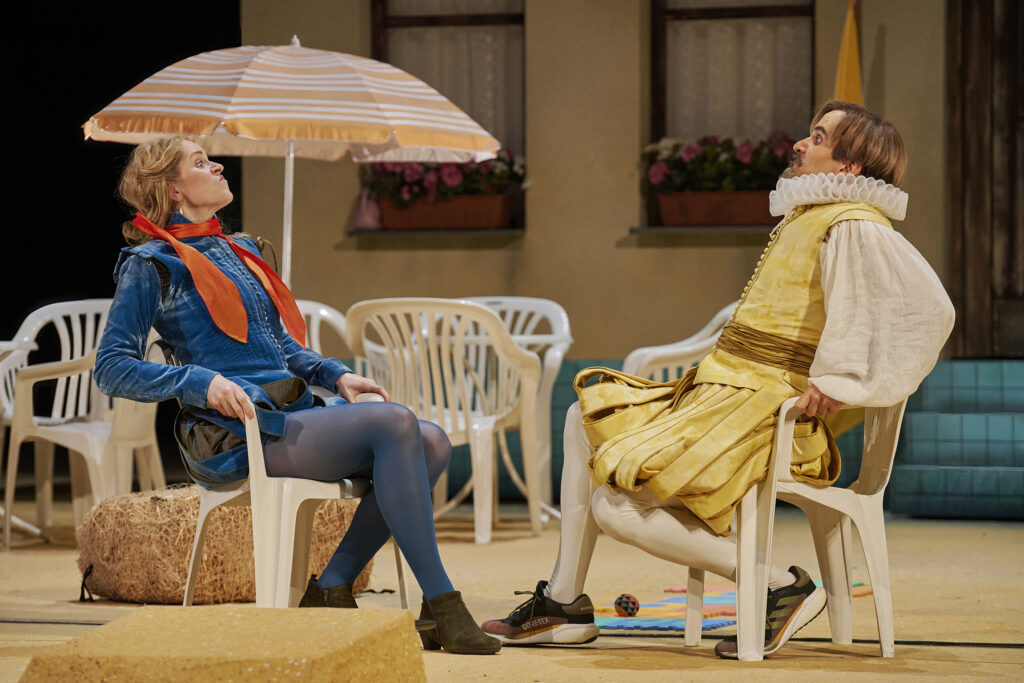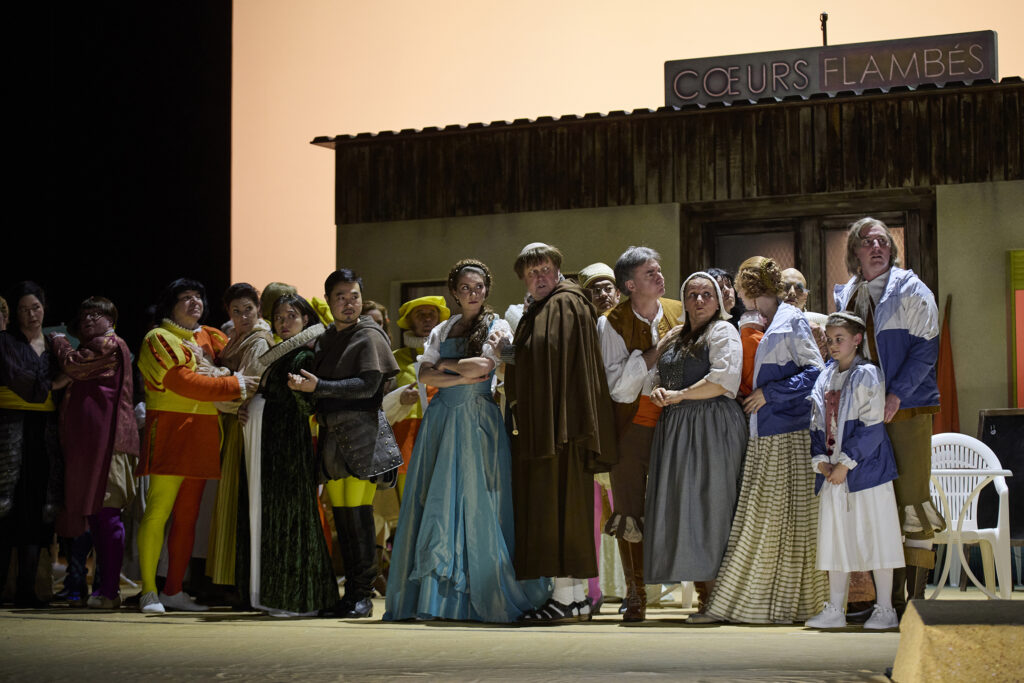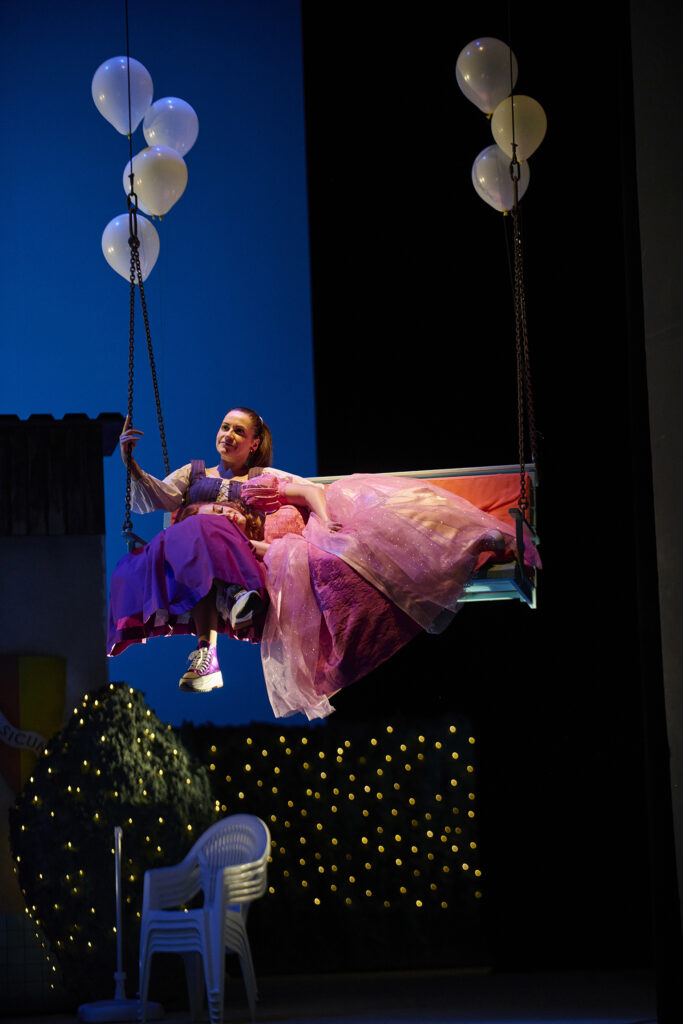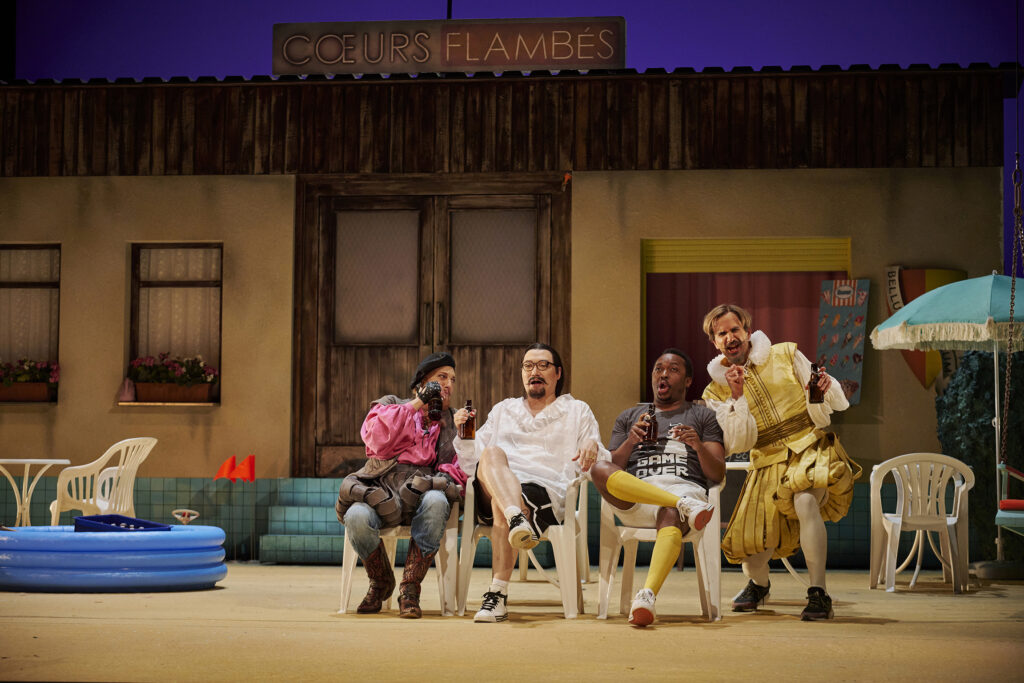The Staatstheater Braunschweig is staging Hector Berlioz’s last opera as a re-enactment comedy, which is completely convincing on the musical side.
It’s one of those things with farewell works to the world: shrouded in an aura of the somehow spherically as pieces of the last things (sometimes unfinished and thus erratically mysterious), these pieces arouse an undefined, uneasy curiosity about necessary explanations on the threshold of transition and beyond. Above all, however, the authors’ own sense of writing a final work lends the whole a particularly beautiful, eerie, mystical veil.

In Hector Berlioz’s “Béatrice et Bénédict”, the situation is somewhat different: modelled on Shakespeare’s “Much Ado About Nothing” and premiered in Baden-Baden in 1862, this “opéra-comique” was created with an awareness of farewell. Already in poor health at this time, Berlioz gradually withdrew from the public eye as a music critic and conductor. “Les Troyens” was already finished, but the last three acts of his main work of music theatre, which was only described as such by posterity, were performed for the first time a year later, in 1863.
Berlioz himself was responsible for the libretto of “Béatrice et Bénédict”, and in the end all that remained of the Shakespeare original was a skeleton. While “Les Troyens” would later go on to make history in terms of reception, “Béatrice et Bénédict” was relegated to a niche existence.
This is surprising, as there are great parallels to another farewell work that also celebrates life with a satisfied look of old age. Verdi’s “Falstaff” is a similarly positive retrospective based on Shakespeare. And the musical theatre expert and critic Berlioz was aware of his own message when he wrote about his last work to his friend Caroline von Sayn-Wittgenstein: “No more of that. Othello’s occupation’s gone.” And in his memoirs, Berlioz finally bids farewell to his life as an artist at the very end when he refers the same quote once again to his work, as Ulrich Schreiber has beautifully emphasised: “Farewell! Othello’s day’s work is done!”
These are the same small, subtle (self-)references that would perhaps give Berlioz the name of a music nerd today, and which abound in “Béatrice et Bénédict”. In terms of musical quality, the new production directed by Franziska Severin at the Staatstheater Braunschweig can now thankfully join the rarities series of re-excavations that has been going on at the theatre for years.

Berlioz thus expands the original to include the conductor Somarone, who is portrayed as an old-school musician who has fallen out of time, but is provided with a quotation from Berlioz’s first piece by the music. Maximilian Krummen plays and sings this role with immense enthusiasm and the beautifully profound expressiveness of his bass.
And when Hero (Governor Leonato’s daughter, who is unconditionally looking forward to her marriage to Claudio) sings her heavenly, blissful aria, Berlioz caricatures it with exaggerated colouratura. Victoria Leshkevich initially sings this appropriately in a warm, cosy timbre, only to switch beautifully to shrill intonation for the endless colouratura. After all, Berlioz’s intention is parodic in nature: to dismantle the sacred state of marriage. And so the director has Hero bring the children out from under the table and chase them in the croaking aria finale.
Another self-reference in the Hero-Ursule duet with a quote from “Les Troyens”: Anna Alàs I Jové in the small supporting role of Ursule comes up with a wonderfully flowing, particularly lyrically clear mezzo, which leaves a lasting impression even due to the brevity of the role.

“Reenactment” is the staging trick that directors could use to help themselves out of a jam in the future – and in a really positive sense: the setting in Benita Roth‘s stage design and costumes sets the standard right at the beginning. After all, the ensemble returns from the war right at the beginning of the play, which subsequently no longer plays a role. After all, opera history is teeming with such wars and peripheral battles. And the pieces, stripped of this colouring and thus brought back to the core, could thank the directors for having freed them from the rigid crust.
“Reenactment” is the term used to describe the re-enactment of battles in traditional costumes and garb. At the Monument to the Battle of the Nations, but also the deeds of the Germans in Belgium during the First World War are often re-enacted by traditional organisations on commemorative and anniversary dates.
The re-enactment battle in “Béatrice et Bénédict” has just ended and the theatre-war protagonists have called it a day. In front of the central entrance building with “Coeurs flambés” letters as a centrepiece, the stage is set for the more or less comedic, slapstick-like play with a sophisticated, well-directed cast.
As we all know, there’s no accounting for taste: And where it gets funny is up to the audience to make up their own minds. However, Berlioz’s intention is honoured by the changing ambiguity in both views. There is a marvellous love of detail in the acting and performances.
The musical side is undoubtedly convincing, with Christine Strubel conducting the Staatsorchester Braunschweig: the many and varied styles and variants of the score are carefully and usually clearly emphasised, from highly romantic shimmering to bold parody, the music is precise and virile as a murmuring narrator. The choir, rehearsed by Georg Menskes and Johanna Motter, sings and acts with gripping intensity.
Of the two main protagonists, Milda Tubelytė gives a Béatrice of high intensity, with a strong character and versatile differentiation, who alternates between a teasing tone and an expressive outburst in her dream aria “Dieu! Que viens-je d’entendre?” effortlessly and precisely, nuanced and particularly convincing in the lower registers. What’s more, her acting is so genuine and comprehensible that this performance leaves nothing to be desired.

Matthew Peña‘s Bénédict has a very bright tenor in the high registers, which supports his partner well with a high level of enthusiasm. In the other roles, Jisang Ryu is convincing as the well-founded Don Pedro, Zachariah N. Kariithi as the radiant Claudio and Randy Diamond as the sturdy Leonato.
Further performances on 8 and 17 May.